The College Board, which administers the SAT college entrance examination and has seen its business battered by the coronavirus pandemic, said Tuesday that it will drop the optional essay section from the SAT and stop administering subject-matter tests in the United States.
“The pandemic accelerated a process already underway at the College Board to simplify our work and reduce demands on students,” the organization said in a statement, adding that it would also continue to develop a version of the SAT test that could be administered digitally — something it tried and failed to do quickly with an at-home version last year after the pandemic shut down testing centers.
The board gave no time frame for when a digital version of the SAT, which would be administered at testing centers by live proctors, might be introduced, but said it would provide more information in April.
The changes to the SAT come as more and more colleges are dropping the requirement that students take the test, as well as its competitor the ACT, a trend driven in part by concerns about equity that received a boost during the pandemic.
Critics of the College Board said the decision was almost certainly driven by financial considerations. The SAT has in the past represented a substantial portion of the College Board’s more than $1 billion in annual revenue.
“The SAT and the subject exams are dying products on their last breaths, and I’m sure the costs of administering them are substantial,” Jon Boeckenstedt, the vice provost of enrollment management at Oregon State University, said in an email.
At the same, he said, the College Board was likely to try to use the elimination of the subject tests to try to convince elite high schools to offer more Advanced Placement courses, whose tests the College Board also administers, as a way to burnish their students’ transcripts. But because A.P. tests have to be taken at the end of a student’s junior year or earlier for their scores to be considered in admissions decisions, more focus on A.P. scores in the admissions process would likely only increase pressure on students.
“Overall, it’s good for College Board, and probably not so good for students,” Mr. Boeckenstedt said. “In other words, par for the course.”
Indeed, in its announcement, the board said that A.P. courses provided students “rich and varied opportunities to showcase their knowledge and skills” and that the “expanded reach of A.P. and its widespread availability for low-income students and students of color” made the subject tests no longer necessary.
David Coleman, the chief executive officer of the College Board, said the organization’s goal was not to get more students to take A.P. courses and tests, but to eliminate redundant exams, thereby reducing the burden on high school students applying to college.
“Anything that can reduce unnecessary anxiety and get out of the way is of huge value to us,” he said.
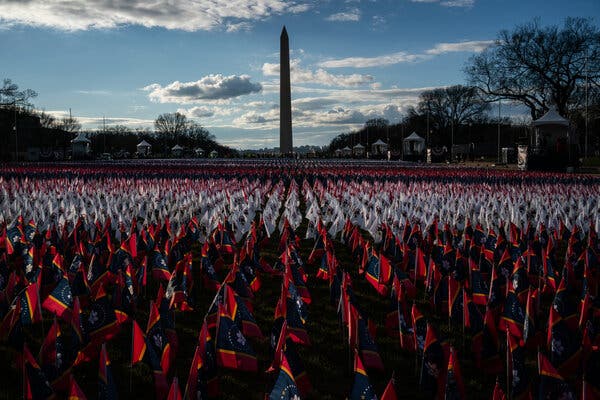
With the United States approaching a once-unthinkable coronavirus pandemic death toll of 400,000 people, Joseph R. Biden Jr., on the eve of his inauguration as president, is assuming the role of mourner in chief and projecting an air of command of the issue that has vexed the Trump administration for the past year.
The president-elect will arrive in the nation’s capital Tuesday evening for a somber inauguration-eve ceremony at the Lincoln Memorial, where 400 lights will be illuminated along the perimeter of the reflecting pool. Each is meant to represent approximately 1,000 Americans who have died during the pandemic.
On Monday night, as President Trump ordered an end to the ban on travelers from Europe and Brazil that had been aimed at stopping the spread of the coronavirus to the United States, Mr. Biden’s aides said he would rescind the move when he takes office on Wednesday, before it was scheduled to go into effect.
Mr. Trump’s order was issued at a time of heightened anxiety over the coronavirus and what Mr. Biden has warned will be a “dark winter.” The country has experienced a post-holidays surge in cases that has overwhelmed some hospitals and led to record numbers of deaths. The national vaccination rollout has been slow and chaotic. And a more contagious virus variant is spreading, while others are being discovered.
Mr. Biden has declared getting control of the pandemic the central issue of his administration, and has been highly critical of how his predecessor handled the worst public health crisis in more than 100 years.
Mr. Trump, in a proclamation, said that the travel restrictions, which apply to noncitizens trying to come to the United States, would no longer be needed on Jan. 26, once the Centers for Disease Control and Prevention start requiring proof of a negative virus test before boarding for all passengers from abroad.
The proclamation appeared to be an effort to help the airline and hospitality industries.
Mr. Trump wrote that Alex M. Azar II, the secretary of health and human services, had recommended ending the restrictions for most parts of Europe and Brazil, while maintaining them for Iran and China, which Mr. Trump said had not been cooperative.
Jennifer Psaki, who will be Mr. Biden’s White House press secretary, said the new administration would not allow the directives to take effect.
“With the pandemic worsening, and more contagious variants emerging around the world, this is not the time to be lifting restrictions on international travel,” she tweeted.
In Washington, the Tuesday night event at the Lincoln Memorial will kick off “a national moment of unity” at 5:30 p.m. Eastern that will include similar commemorations at the Empire State Building in New York, the Space Needle in Seattle and other landmarks, with events also planned for Mr. Biden’s hometowns, Scranton, Pa., and Wilmington, Del.
The inaugural committee’s chief executive, Tony Allen, the president of Delaware State University, said in a statement that the inauguration “represents the beginning of a new national journey — one that renews its commitment to honor its fallen and rise toward greater heights in their honor.”
Michael D. Shear and Glenn Thrush contributed reporting.

Across the United States, state education and district officials say the pandemic has intensified a longstanding teacher shortage to crisis levels.
As spikes in cases and exposures have forced more teachers to stay home, the shortage is among the main reasons that schools or whole districts have had to halt in-person instruction, often for weeks.
“It’s just such a ripple effect,” said Laura Penman, the superintendent of Eminence Community Schools, a tiny district in rural Indiana. The district had to briefly close its only elementary school in November because an infected educator had come into contact with several colleagues.
Desperate to stanch staffing shortfalls, districts are increasing pay for substitutes and even advertising for temporary positions on local billboards. Some states and districts have suspended college course requirements, or permitted abbreviated online training, for emergency substitute teachers.
Although stopgap solutions may be necessary during the pandemic, education experts say they could diminish the quality of in-person learning, further disrupting education for a generation of children.
Public school systems in the United States have been grappling with a shortage of full-time teachers for years. There is reduced education funding in many states, and one study before the pandemic reported that schools nationwide needed more than 100,000 additional full-time licensed teachers, particularly in science and special education. The coronavirus is vastly exacerbating that shortfall, experts say, by prompting many teachers to quit or retire early.
Education researchers said the pandemic teaching shortage was likely to intensify learning disparities, especially in high-poverty schools where experienced substitutes often chose not to work.
“It’s a disaster. Those kids who have already got the worst of Covid and its consequences are the ones who are going to face a larger lack of sufficient, and sufficiently qualified, teachers,” said Emma Garcia, an education economist at the Economic Policy Institute in Washington. “It’s going to have negative consequences immediately and it’s going to take them longer to be able to catch up.”
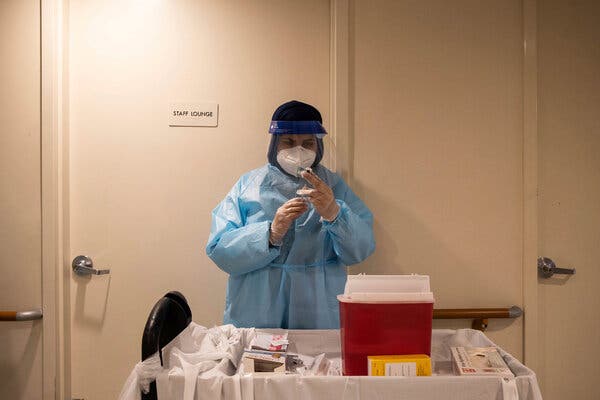
The number of nursing home workers in New York State who have declined the coronavirus vaccine rivals the number who have been inoculated, raising concerns about vaccine hesitancy among those who are in contact with some of the individuals at highest risk of a severe infection.
As of Monday, about 37 percent of the more than 130,000 people working in “skilled nursing” facilities in the state have been vaccinated, according to the governor’s office.
But 32 percent of the workers have declined to be vaccinated.
In some parts of the state, staff members who have declined outnumber those who have been vaccinated. On Long Island, 46 percent declined while 34 percent have been vaccinated.
Officials cautioned that the vaccination process for long-term-care facilities was still in its early stages — the first of three inoculation phases concluded on Sunday, and many workers have not had the chance to get vaccinated. They said they hoped the proportion of staff members declining would decrease as they saw their colleagues getting vaccinated safely.
Gov. Andrew M. Cuomo said at a news conference on Monday that the state had earmarked 225,000 doses for residents and workers in long-term care facilities and that 105,000 had been used. Of the 120,000 unused doses, 15,000 will be reserved for residents and 40,000 for staff members; the remainder will be reallocated to the main vaccination program, Gareth Rhodes, a top aide to Mr. Cuomo, said Tuesday.
The vaccination rate among residents was higher: 67 percent have been inoculated, while 16 percent have declined. Workers and residents who are medically able to get the vaccine but had previously declined will still be able to get a shot if they decide to.
The state health department has done online events and other educational outreach with nursing homes, largely to address vaccine hesitancy.
Many of the workers are lower-income and people of color, communities that tend to have higher rates of vaccine hesitancy. In a speech on Monday marking Martin Luther King’s Birthday, Mr. Cuomo said he understood their distrust, citing the decades-long Tuskegee experiment in which government researchers withheld treatment from Black men infected with syphilis.
“No one can ameliorate or justify the victimization and discrimination the Black community has endured,” Mr. Cuomo said.
But, he said, “We have had New York’s doctors, the best on the planet, review the vaccine, and they vouch for it. I will take it as soon as I am eligible.”
As the national death toll from the virus nears 400,000, people in the United States have been dying of Covid-19 at the highest rate of the pandemic. The new tally is the equivalent of wiping out a city the size of Oakland, Calif. It is on the order of Sept. 11 deaths more than a hundred times over. At that scale, the human brain compensates with a defense that political psychologists call “psychic numbing.”
On one single day in a monthlong period during which the United States lost more people to Covid-19 than in any other during the pandemic, Stacey Williams, a beloved youth football coach and father of five in Florida, was among more than 2,000 Americans with the virus to die.
Along with Mr. Williams, Jose H. Garcia, 59, the longtime chief of the Roma Police Department in the South Texas border region who was known to friends and family as Beto, died of Covid-19 complications. So did Nelson Prentice Bowsher II of Washington, D.C., 80, an affordable-housing advocate whose family’s feed mill business was a fixture of South Bend, Ind., through the 1960s.
Combing through hundreds of local obituaries, county records and interviews with families, New York Times reporters were able to piece together a tapestry of some of the lives lost on that day, Jan. 4.
Sherri Rasmussen, 51, of Lancaster, Ohio, was one. She is survived by a daughter who said she will always remember the day her mother gave her purse to a woman who complimented it in a CVS store, saying, “I want to pay it forward.”
And then there was Pedro Ramirez, 47, who loved his Puerto Rican homeland, salsa dancing and restoring Volkswagen bugs. Days before, he told his wife, Shawna Rodriguez, about the vaccine and how people like him, with chronic medical issues, would be getting it soon.
“I told him I loved him and how sorry I was that he had to be in the hospital by himself,” said Ms. Ramirez, 52, who works in a bridal salon in Macon, Ga.
The surge in deaths reflects how much faster Americans have spread the virus to one another since late September, when the number of cases identified daily had fallen to below 40,000. Since early in the pandemic, deaths have closely tracked cases, with about 1.5 percent of cases ending in death three to four weeks later.
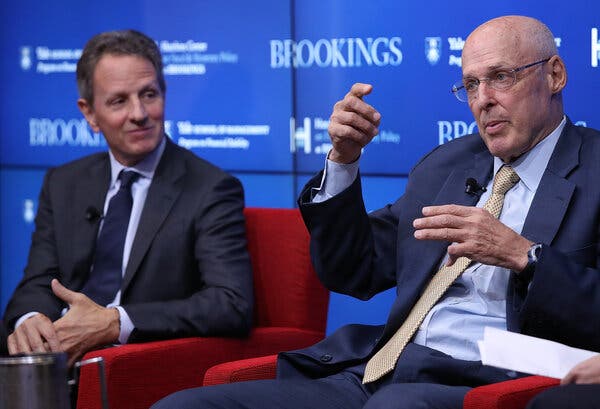
Janet L. Yellen won the endorsement on Tuesday of eight former Treasury secretaries, who called for her speedy Senate confirmation so that she can assume the job under President-elect Joseph R. Biden Jr.
The letter of support was released shortly ahead of Ms. Yellen’s testimony at her confirmation hearing before the Senate Finance Committee. The group said that any delay would pose an unnecessary risk to the economy at a critical time.
“With millions of Americans out of work, long-term unemployment rising, and activity stalled in large sectors of the economy, daunting challenges will face the incoming administration. Addressing these pressing issues will require thoughtful engagement by the Department of the Treasury,” they wrote. “Any gap in its leadership would risk setting back recovery efforts.”
They added that a delay in confirming Ms. Yellen would also sow confusion among American allies, who traditionally rely on the United States for global economic leadership in times of crisis.
The letter was signed by George P. Shultz, James A. Baker III, Robert E. Rubin, Lawrence H. Summers, John W. Snow, Henry M. Paulson, Jr., Timothy F. Geithner and Jacob J. Lew. That all-male crew reflects the significance of Ms. Yellen’s nomination — if confirmed, she would be the first woman to lead the Treasury in its 231-year history.
The former secretaries said that Ms. Yellen, a former Federal Reserve chair, was uniquely qualified for the job because of her experience and knowledge.
Ms. Yellen is expected to have a smooth path to confirmation. An acting Treasury secretary is expected to fill the void at the Department between when Treasury Secretary Steven Mnuchin departs on Wednesday at noon and when Ms. Yellen is confirmed.
Global roundup
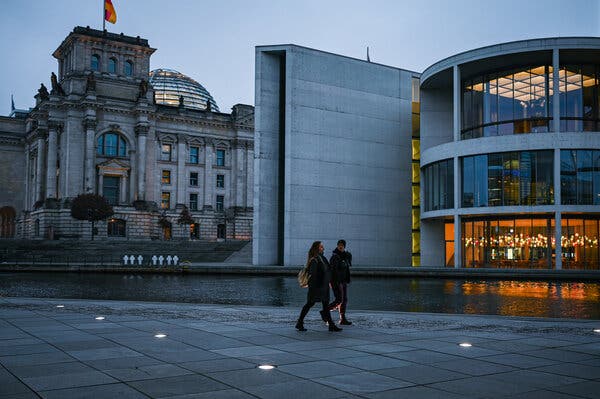
As German authorities prepare stricter lockdown measures, some German states are planning guarded mandatory quarantine centers for the very few who repeatedly disobey quarantine rules, according to an investigation by Die Welt am Sonntag, a national Sunday paper.
States like Schleswig-Holstein in the north, Brandenburg around Berlin and Baden–Württemberg in the southwest are preparing such mandatory quarantine sites in hospitals, refugee centers and a youth detention center.
“Pandemic control lives or dies with public acceptance,” Sönke Schulz, a regional leader in Schleswig-Holstein, told Kieler Nachrichten, a local daily. “This would suffer if noncompliance remained without consequence.”
However, since there are very few known cases of people who repeatedly flout quarantine and isolation rules and fines — which are imposed because someone either has Covid, has had close and prolonged contact with an infected person or has come back from a high-risk foreign country — the states are only planning for a few sites.
On Tuesday Chancellor Angela Merkel and governors are meeting to agree on new and extended lockdown rules. As of Monday, the seven-day average number of cases was 16,886, according to a New York Times database, slightly higher than when the national lockdown began at the beginning of November. Starting in mid-December, politicians strengthened the lockdown, closing most nonessential shops and most schools.
But even as numbers start to decline slowly, the German authorities are worried about a more transmissible variant of the virus that is thought to be responsible for a spike in infections in Britain.
Among the other developments around the world:
-
Rwanda announced restrictions on movement and businesses in the capital, Kigali, on Monday, as coronavirus cases continued to surge across the country. The authorities closed all places of worship, shut down public transportation, banned travel between the capital and other parts of the country, and ordered all workers other than those providing essential services to work from home. Farming can continue, and businesses selling food, medicine, fuel or cleaning products may operate but must close by 6 p.m. Funeral gatherings are permitted but cannot exceed 15 people. Foreign tourists will continue to be allowed to enter and travel around the country during the two-week lockdown, but they must present a negative P.C.R. test on arrival and departure. Rwanda has reported 11,259 coronavirus cases and 146 deaths so far, and the rate of positive test results has risen sharply since mid-November, reaching 7.7 percent on Tuesday.
-
A survey about coronavirus infections in Britain from the Office for National Statistics estimates that one in eight people in England — about 5.4 million people over the age of 16 — had antibodies against the virus in December, suggesting they were infected in the past. The report suggests about one in 10 people across Britain had such antibodies. Excess deaths were at the highest level since last May, the analysis found, and in England the Covid-19 mortality rate in the most deprived areas last month was more than twice that in the least deprived.
-
Officials in Hong Kong said on Tuesday that current social distancing measures, which include a ban on dine-in service after 6 p.m., would be extended for at least another week, a day after the number of new coronavirus cases returned to the triple digits for the first time this year. They also said they would bar entry to travelers who had spent more than two hours in Ireland or Brazil in the past 21 days — the same rule as applied to Britain and South Africa, where two more transmissible variants of the virus were first detected.
-
Starting Jan. 26, everyone flying to New Zealand will have to show proof before departure that they have tested negative for the virus, the government said on Tuesday, unless they are coming from Australia, Antarctica or most Pacific islands. Two weeks of quarantine continues to be mandatory for all travelers to New Zealand, which last recorded a locally transmitted case in November. Last week, the country began requiring predeparture tests for passengers from the United States and Britain.
-
Japan’s southernmost prefecture, Okinawa, declared a state of emergency after a spike in cases, Reuters reported. Okinawa Governor Denny Tamaki said emergency measures include asking restaurants and bars to close by 8 p.m. and residents to refrain from non-urgent outings after 8 p.m. The emergency is scheduled to last until Feb. 7. The prefecture confirmed 113 cases on Tuesday, its third-highest daily tally on record, the public broadcaster NHK reported. Shizuoka prefecture, home to Mount Fuji, also declared “an emergency alert” of its own on Tuesday after it found cases of a more contagious coronavirus variant, Kyodo News reported.
-
Britain’s health secretary, Matt Hancock, said on Tuesday that he would isolate at home for the next six days after a notification from the National Health Service coronavirus app told him he had been in close contact with someone who tested positive. Mr. Hancock, a key figure in country’s virus response, appeared in a televised coronavirus briefing Monday evening and tested positive himself in March.
-
Scotland’s lockdown will be extended to mid-February and its schools and kindergartens will remain closed until then, First Minister Nicola Sturgeon said on Tuesday. Early in January, people were asked to stay at home for all but essential purposes, and most students returned to remote learning, as the country tried to clamp down on the more transmissible British variant of the coronavirus. The restrictions were originally set to expire at the end of the month, but Ms. Sturgeon said on Tuesday that the country’s case numbers were still high and that staying locked down was vital to protect the National Health Service from becoming overwhelmed.
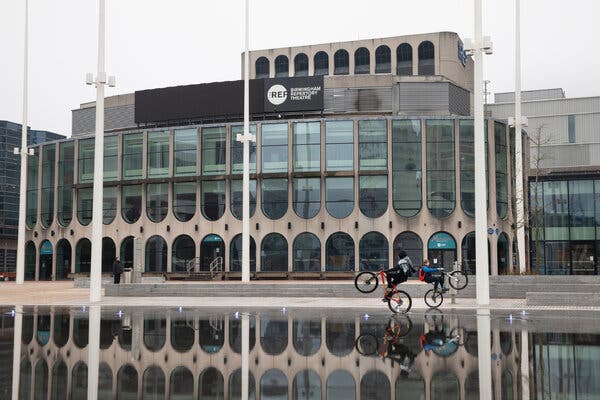
Britain’s theaters have been in financial crisis since the coronavirus pandemic forced them to shut last March. Although a few have hosted performances for socially distanced audiences, most have only survived through a combination of crisis grants and layoffs.
The largest playhouse in Birmingham, Britain’s second-largest city and one of its most diverse, is leasing space to the courts service. But the move has angered theatermakers in the city who claim the courts and the police have historically targeted communities of color, and that theaters should be kept as spaces for creativity.
Jay Crutchley, a Black director, said in a telephone interview that the Rep — as the Birmingham Repertory Theater is known there — had “just endorsed probably the biggest systematic oppressor of Black people in this country.” Young Black men were disproportionately represented in Britain’s prisons, he added, and many people growing up in Birmingham — white and Black — had bad experiences with the police.
“I’ve had close friends go through the court system,” he said, “and I can’t tell you how many times I’ve been stopped and searched.”
The Rep’s decision to host a court was turning the theater into a potential site of trauma, Mr. Crutchley added. “There’s a line for me where ethics gets in the way of money,” he said.
The theater, whose spokesman declined an interview request, said in a blog post that the deal with the courts was needed to secure its financial future, and on Monday, the theater announced two online meetings to listen to the feedback of anyone concerned about its decision.
As makeshift courts spring up in some theaters, Britain is scrambling to prevent long delays in its criminal justice system. Four top inspectors for policing, prisons, probation and prosecutions warned in a report on Tuesday that the court case backlog in England and Wales posed “the greatest risk to criminal justice.”
The pandemic has exacerbated delays in the criminal justice system, prompting the inspectors to express “grave concerns” about the situation. The backlog in crown courts, where the most serious criminal cases are heard, has reached more than 53,000 cases and it is believed that some crimes from last year will not go before a jury before 2022.
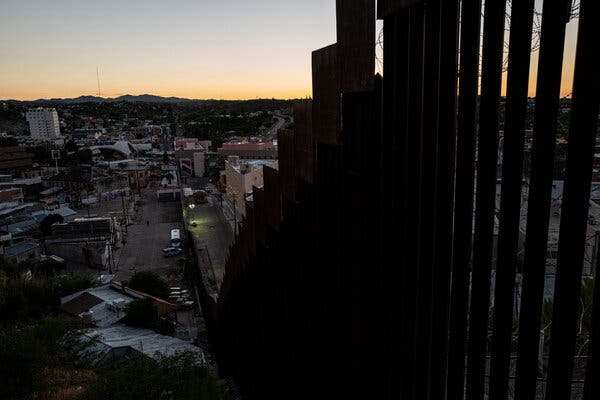
The coronavirus pandemic has pushed millions of Americans into poverty and stripped more than 5.4 million of them of their health insurance, according to a study by Families USA, a nonpartisan consumer advocacy group.
Many people have put off medical procedures, and seen their health deteriorate significantly. The fear of large medical bills has outweighed fear of contagion for some, giving rise to an increased number of patients seeking medical treatment in a foreign country.
“We are seeing a pent-up demand for medical tourism during the pandemic, particularly in the U.S. where a fast-growing number of Americans are traveling across the land border with Mexico for health purposes,” said David G. Vequist IV, the founder of the Center for Medical Tourism Research and a professor at the University of the Incarnate Word in San Antonio.
Even before the pandemic, millions of Americans traveled to other countries for savings of 40 to 80 percent on medical treatments, according to the global medical tourism guide Patients Beyond Borders. Mexico and Costa Rica have become the most popular destinations for dental care, cosmetic surgery and prescription medicines, while Thailand, India and South Korea draw patients for more complex procedures involving orthopedics, cardiovascular issues, cancer and fertility treatment.
In 2019, 1.1 percent of Americans traveling internationally did so for health treatments, according to the National Travel and Tourism Office, although that figure accounts only for those who went by air.
Medical tourism has been decimated by coronavirus restrictions, but, even so, the twin crises of the economy and the enormous strain that Covid-19 has placed on the already faulty American health care system are pushing many patients to travel. Demand for nonessential surgeries has also been building up after more than 177,000 scheduled surgeries were postponed in the United States between March and June last year, according to the Center for Medical Tourism Research.
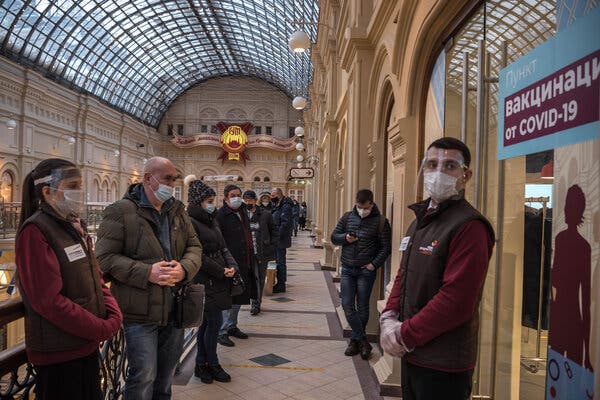
The Russian government is considering issuing coronavirus health certificates that could ease travel and commerce for people who have been vaccinated or who have antibodies from surviving the disease, while sharply limiting the liberties of others — an idea that has also been floated in the European Union and by private companies.
Proponents say that such documents, often called Covid passports, could ease airline travel and hasten the reopening of theaters, cruise lines and other settings where people congregate.
Opponents fear a dystopic system that would limit the rights of people who have been careful to avoid infection and are unable or unwilling to be vaccinated. Russia has a grim history rooted in the Soviet era of controlling citizens’ movements, through a residency permit system that was never fully abolished.
Internationally, airlines have already tested electronic certificates showing negative test results for passengers. Those systems could be expanded to show the status of those with some immunity.
The head of the Russian Parliament’s committee on public health, Dmitri Morozov, said on Tuesday that a Covid passport was “very important and needed.”
Collecting people’s Covid health status in a government system, he said, could also provide important data for public health officials. “This is great, this is the new world,” he said. Mr. Morozov did not specify what kinds of information a Covid passport would display.
A regional governor in Russia, Radi Khabirov, proposed on Monday that Covid passport holders receive discounts at stores, as an incentive for people to obtain the certificate.
President Vladimir V. Putin’s spokesman, Dmitri S. Peskov, said on Tuesday that the government is considering issuing Covid passports, perhaps in digital form, but that Russia wanted to coordinate with other countries to agree on standards for them.

Skylar Mack, the American college student who was released from a prison in the Cayman Islands last week for violating coronavirus restrictions, said in an interview that she “deserved it.”
In a segment that aired on ABC’s “Good Morning America” on Tuesday, Ms. Mack, 18, apologized for breaking the rules and said that any anger toward her was justified, adding that if she had gotten someone sick, she would not have been able to live with herself.
She was released on Friday after spending more than a month behind bars.
“I deserved it,” she said. “I was like, ‘You know what, I made this mistake, and it sucks, you know, but you did it to yourself.’”
After finishing the semester at Mercer University in Georgia in late November, Ms. Mack flew to the Cayman Islands to watch her boyfriend, Vanjae Ramgeet, 24, compete in the islands’ Jet Ski racing national championship.
She arrived on a Friday and tested negative for the coronavirus. While the British territory’s laws required her to remain in her hotel room for 14 days, on Sunday, the day of the championship, she slipped the electronic monitoring bracelet from her wrist. She went to the beach and cheered on Mr. Ramgeet as he won first place.
In mid-December, a Cayman Islands court sentenced Ms. Mack and Mr. Ramgeet to four months in prison. After an outcry that the punishment was too harsh, a panel of judges reduced the sentence to two months. Her release after a little more than half that time was in line with what her lawyer expected. Mr. Ramgeet was also released on Friday, according to Ms. Mack’s family.
Thousands of others around the world have been similarly punished for breaching quarantine restrictions. Extensive travel restrictions have failed to stop the virus from spreading, with some people viewing themselves as above the rules.
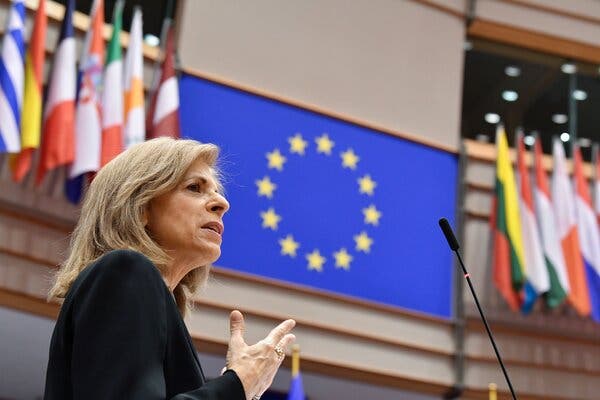
The European Union’s executive arm on Tuesday set ambitious Covid-19 vaccination goals for its 450 million citizens, after a sluggish start to its inoculation efforts.
The European Commission said that the bloc’s 27 member states should aim to have at least 80 percent of their citizens over the age of 80, as well as at least 80 percent of their health care workers, vaccinated by March, and at least 70 percent of the whole population vaccinated by this summer.
“We are racing against time, but not against each other,” said Stella Kyriakides, the bloc’s health commissioner. “And we’re all racing together as one team.”
The commission’s call comes as E.U. countries face a resurgence of coronavirus cases, turbocharged by emerging new variants, as well as the grim reality of prolonged lockdowns. E.U. leaders are due to meet by teleconference on Thursday to endorse the Commission’s proposals.
The commission also urged the bloc’s national governments to update their testing strategies, which remain the competence of member states, and urged them to genome sequence more positive coronavirus test results: 10 percent of them, up from the current rate of below 1 percent. Genome sequencing helps quickly identify new variants, while also keeping track of the progress of known ones.
“If we do not act now with determination, we might not be able to contain the risk of a potentially harsh third wave,” warned Ms. Kyriakides. “The numbers are already worrying across the E.U., and hospitals are under a lot of pressure. We cannot be complacent.”
In order to salvage border-free travel across the bloc, the commission also opened the debate over using so-called vaccination certificates, which could permit easier travel for people who’ve been vaccinated. The concept has been advocated by Greece and other smaller states, which heavily depend on tourism, but opposed by several larger E.U. countries such as France.
The bloc intends to determine a common approach by the end of January. For the moment, the commission recommended that all nonessential travel be strongly discouraged. Traveling restrictions, as well as testing and quarantine rules, are currently the prerogative of national governments, and have resulted in a patchwork of chaotic measures across the continent.





